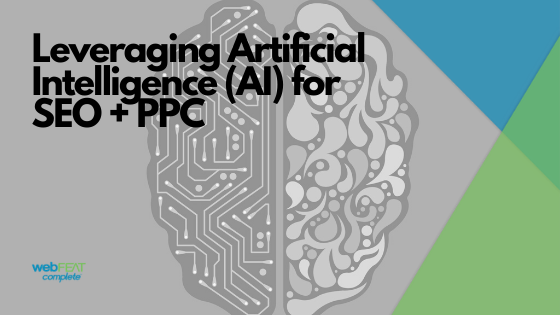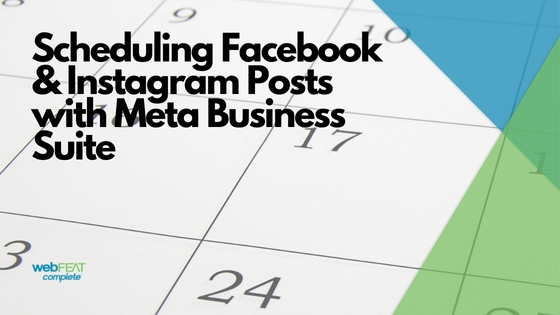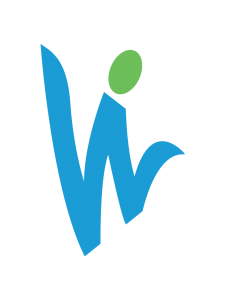Would you rather listen to a podcast about this? Check it out!
Artificial Intelligence (AI) is everywhere. AI is running the street lights in your neighborhood and helping to get that DoorDash order to you throughout this pandemic.
AI and digital marketing go hand in hand. Search engine algorithms and digital advertising products rely on AI.
We can leverage AI to expedite digital marketing results and make them more significant. Given this, machine learning in-part with AI offers high-ROI potential.
Here’s how.
SEO-Automation
On the SEO side, the more we can automate for our clients the more time we have to tackle time-consuming, advanced strategies. Along with this, we can gather more insights, faster.
Content Creation for Topical Relevance + Authority
Google’s AI can help us out a lot with content.
If we have a new client that we need to ramp up research on, the first place we’ll go is the search results.
By doing a search that we think would be relevant to the business, we can see different features like “related searches” or “people also ask”. Maybe there are a lot of local listings and a local map pack—all of this can help us to better understand what the target audience is looking for, quickly.
When you do this extensively, you uncover a much better view of your target audience, that man competitors might not be seeing. You’ll also uncover a lot of sub-topics within the primary topic. If you build this into your content, you create topical relevance that showcases your knowledge on the subject matter.
Tools/Software for Research
What would we do without our tools + software?! Not just in the SEO/Digital Marketing industry. We all have tools of the trade. They all have artificial intelligence of some sort that helps us to do a better job, and make our campaigns more successful.
Screaming Frog
This software is essentially a bot that crawls websites, and identifies a lot of detailed information about the respective website. Have a”fake” bot go in and gather all of the details about a website can lead to fast insights that are actionable.
For example: We crawl a website. We see that there are a few 404’s, some unnecessary 301 redirects, and some pages have noindex tags on them (that should be indexed). Those can be fixed right away and make a positive difference.
semrush Competitor Tools
Check-Ins
Every morning on Monday, the SEO team inboxes receive some key information on Analytics accounts and client rankings.
If an analytics account were to stop tracking data, we’d know! This provides a safeguard to the loss of information.
Then with semrush, we’ll get some updates on ranking changes for key phrases, which can help us see trends and take action to cross thresholds.
For example: If we receive notifications 4 weeks in a row with a phrase reaching the 3rd position in the search results, but never going beyond that, we know something is limiting it. Maybe there are strong listings/directories preventing it from ranking, or other features in the search results. With further research, we can identify, and move the ranking needle for particular phrases.
Search Console identifying SERP errors
Search Console has a coverage errors section where Google notifies you if something is broken, or off.
By automatically producing this information, all we need to do is simply check on it, and make the fixes! Then we can actually validate the fixes directly with Google.
Leveraging + Visualizing Data
This is arguably the most important item.
Google Analytics provides so much tracking data when implemented on a site. Perhaps that is more simply “tracking”, but all of that data that is tracked can be input into tools and software like those noted above, to pull insights and recommendations.
Honorable Mention: Python
There is a lot of talk in the SEO community about python and how it can be used to automate processes, improving data collection and SEO efforts. At this time, we’ll leave it to the best of the best to explain this one! We’ve got some learning to do-blog to come soon : )
Add up all the time you’ll save over the course of the year, that’s a lot of time to put into advanced SEO strategy work that can create sustainable long-term growth.
PPC-Personalization
AI enables marketers to set up precisely targeted advertisements that resonate with users, and have higher CTR + Conversion Rates.
Dynamic Ads
Dynamic ads create a dynamic (changing) headline based the search. Instead of having to enter headlines and descriptions, we just enter descriptions!
Google’s AI creates a tailored headline based on the search query, and your targeted landing page.
Responsive Ads
These are a newer form of advertising with Google. They recommend 1 responsive ad, and 2 search text ads. Responsive ads are an opportunity to specifically leverage Google’s AI.
Rather than the traditional 2-3 headlines and 1-2 descriptions, responsive ads allow you to enter numerous headlines and descriptions.
Google takes those and utilizes user-searches + historical data to create the best digital advertisement respective to each specific search.
We’ll have a detailed blog post diving into responsive ads soon.
Learning Period (Google Ads)
We should probably dive into the learning period with a detailed blog post too!
Google representatives have told me that you should allow ads to run for 1.5-2 weeks after major changes for the “learning period”. This period of time enables Google’s AI to gather data, understand what you’re targeting, your ads, and better serve your ads in-part with your bid strategy.
We’ve had trouble balancing that learning period, with seeing results and making improvements. If something is already sticking out (ex: lacking conversions) after a week, clients are going to be inclined to make a change, and rightfully so.
We encourage patience with accounts, but some accounts are time-sensitive and require immediate change when trends are discovered.
Leveraging + Visualizing Data
Again-crosses the line with simply tracking, but what you can do with the data can utilize AI.
Google Ads offers a lot of “bid adjustments”, “bid strategies”, that can amplify the success of your account.
If you’ve generated a good amount of conversions, it may be time to switch your bid strategy from something like “maximize clicks” to “maximize conversions.” When that is done, Google’s AI will take historical conversion data, and try to position your ads to better encourage conversion.
If data shows no conversions are coming from Tablet, then you can put a -100% bid adjustment on tablets, and Google’s AI will only show ads to mobile/desktop.
Leverage artificial intelligence with your PPC campaign-expect faster, more significant results.
Social Media-Coming soon.
Drive More ROI Faster with AI
We leverage AI with all of our clients to generate digital marketing results + ROI.
Contact us to discuss your business’s potential.
“”





